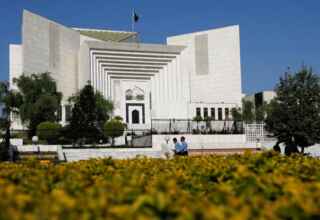
ISLAMABAD, Nov 15 (EW): The Supreme Court on Tuesday issued notices to PTI Chairman Imran Khan and other party leaders in a case related to the “contemptuous” remarks against the Election Commission of Pakistan (ECP).
The ECP, on October 14, filed a plea in the apex court requesting transfer and consolidation of six petitions, filed by Imran Khan and others, challenging its contempt notices in different high courts.
In October, the electoral watchdog filed a petition urging the apex court to lift the stay order issued by the Lahore High Court (LHC) against ECP’s contempt notices to Khan and the other leaders of the party.
In its notices issued on August 19, the ECP accused the ex-premier of levelling “baseless allegations” at the ECP and its chief in his addresses on July 18, 21, 27, August 4 and 10.
Today’s hearing
A three-member bench heard the ECP’s plea seeking the transfer of its cases under trial in different high courts to a specific high court.
The court remarked that the electoral body has maintained in the plea that they should pursue the cases or prepare for the general and local government elections.
It said that the ECP has also presented the judicial precedence in regard to the consolidation of cases under the sought apex court’s orders.
The court later served notices to Khan, Fawad Chaudhry and Asad Umar and adjourned the hearing for 15 days.
The plea
The ECP’s petition filed via Sajeel Sheryar Swati Advocate under Article 186A of the Constitution for the transfer of PTI petitions pending before various high courts to one high court, in the interest of expeditious disposal and justice. The ECP made Khan, Fawad Chaudhry, Asad Umar, Mian Shabbir Ismail Advocate, Daniyal Khalid Khokhar, Federation of Pakistan as well as chief secretaries of Punjab, KP, Sindh as respondents.
The commission submitted that in August and September, 2022, it issued notices in the exercise of its powers of contempt, adding that the recipients of these notices invoked the constitutional jurisdiction under Article 199 of different high courts against the notices and contempt proceedings through four different petitions on inter alia the ground that section 10 of the Elections Act, 2010,.







